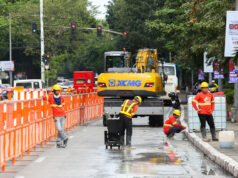We must reject the ‘new or better normal’
Author Helen Andrews once recounted this great story about former US Secretary of State George Schultz. While visiting Beijing in the 1980s, serious concerns were raised about the Chinese bugging US offices. The CIA recommended using “hush phones,” which were essentially masks connected by a wire running down to another mask. The idea was for those needing to converse to put on those masks while talking. Secretary Schultz looked at the masks and flat-out refused to put them on. His reason?”I am a grown man, and I have some dignity.”
That response is particularly relevant today as more and more Filipinos are being demanded they accept their being children vis-à-vis the ever-caring, all-providing “father” government. Justified, of course, to protect us from the dreaded China coronavirus and to ease us into the “new normal.”
Perhaps people haven’t noticed it or chose not to notice it but in many ways large parts of the country were essentially placed under martial law. Not martial law under the 1987 Constitution but — interestingly enough — under martial law’s 1935 Constitution version.
This was done, of course, not through an express declaration of martial law (as that would be downright unconstitutional) but rather through the Bayanihan Law, plus the circumstances in which it was implemented and how it was implemented.
Martial law under the 1987 Constitution is actually quite watered down. First of all, it requires an invasion or rebellion to happen. And even then, the 1987 Constitution made it a point to say that our civil liberties (ie., freedom of speech, assembly, religion, property, contracts, due process, rights of accused, etc.) still apply, the courts continue to function, and Congress has the authority (and duty) to strictly monitor martial law’s implementation.
With the enactment of the Bayanihan Law, the government was able to get around the invasion or rebellion requirement. All that was needed was a virus that science now tells us seriously affects only 5-10% of the population, is asymptomatic 99.5% of the time, and has an infection fatality rate of .26%.
And yet the Bayanihan Law unleashed powers that basically locked-up the otherwise healthy 90% of the population home, with strict curfews imposed, travel heavily regulated, businesses closed, any form of criticism monitored and threatened, communal religious practices stopped, university classroom learning restricted, and even court operations were hampered.
The news saw officials handing out individually subjective punishments on citizens without trial — many for simple transgressions like being caught outside the curfew or traveling without the necessary papers — in violation of due process, equal protection, the rule against cruel and degrading punishments, and the rule of law.
Media was far from helpful. It breathlessly amplified the fearful pronouncements coming from government, such that our fear-ridden people were primed and happy to submit to government control. And submit we did.
People meekly allowed themselves to being told when to walk, how to talk, and what to do. Not since the days of the Soviet Union has a people been subjected to such captivity and control.
Some say that the lockdowns were for the people’s good. But that’s the same exact thing that the Soviet rulers said to their people.
That and spending hours in long lines just to enter grocery stores with empty shelves.
The point here is that we Filipinos should really take stock of the situation and insist that the Constitution and our constitutional rights be upheld.
Whether or not there was a need for the Bayanihan Law three months ago is something people of good faith can disagree on but without doubt such is not needed now.
No extra powers need be given, the Constitution and the Local Government Code already allows the Executive Branch and the local government executives, respectively, all the powers they need to confront this health issue. What is necessary is that government steps back and let the people get on with building this country.
And yet, despite all this, despite the added fact that an Anti-Terror Law is practically an inevitability, our political leaders are still not satisfied and still covetous of more powers. One way they’re doing so is via the so-called “Better Normal Bill” (currently HB 6864, which passed the House of Representatives on second reading).
On the surface, the Bill claims to protect the public’s health. But what it does is to allow the government to monitor, regulate, and control — under penalty of imprisonment — almost every facet of our lives, from how we eat, how we travel, the conduct of businesses, education, and even private gatherings.
Filipinos must reject the Better Normal Bill. We do not need the government telling us how to run our lives. And especially now that our people’s creativity, innovativeness, and energy are needed to kickstart an economy damaged immensely by an egregiously wrong (and long) lockdown, for the government to micromanage our people at this time is sheer insanity.
Jemy Gatdula is a Senior Fellow of the Philippine Council for Foreign Relations and a Philippine Judicial Academy law lecturer for constitutional philosophy and jurisprudence.
https://www.facebook.com/jigatdula/
Twitter @jemygatdula



